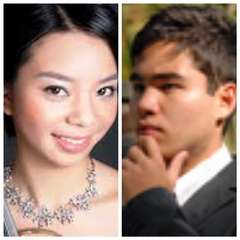|
Back
Artists at Their Best New York
Peter Jay Sharp Theater, Symphony Space
08/04/2018 -
Claude Debussy: L’Isle joyeuse
Sergei Prokofiev: Overture on Hebrew Themes, Opus 34
Pablo de Sarasate: Navarra “Spanish Dance”, Opus 33
Felix Mendelssohn: Octet for Strings in E-flat Major, Opus 20
Alexander Fiterstein (Clarinet), Martin Beaver, Eric Silberger, Sirena Huang, Mari Lee (Violins), Andrew Gonzalez, Colin Brookes (Violas), Alexander Buzlov, Borislav Strulev (Cellos), Klara Min, Spencer Myer (Pianos)

S. Huang/E. Silberger
The published “mission” of “Classical Bridge” is “to create dynamic partnerships among musicians, music lovers and professionals.” And while this hardly sounds original, “Classical Bridge” is presenting more than music. Their seven evenings, starting last night, will have had eight original pre-concert discussions.
Later this week, musicians will discuss “developing new traditions” (oxymoronic? Never mind), new approaches to recording, finding original voices as soloists, an interview with French composer Jean-Frédéric Neuburger and yet another Bernstein Centenary discussion.
The details of pre-concerts and concerts are at classicalbridge.org, yet I can only speak of the music at the opening.
The soloists were excellent, the hour-long concert highly professional. The only problem was that, once we heard something terrific, we heard little more of the soloist.
The opening was a delicious Debussy exhibition by Spencer Myer. His L’Isle joyeuse was a technical joy-ride from the opening trills through the cadenzas through the fanfares and Lisztian ending.
Could Mr. Myer have been less sérieux and more joyeux? Could that central section have been more–in fact exaggeratingly–expressive? That was his decision to make, so he held the center between ecstatic and internal, and did a good job of it.
And a whole recital by Mr Myer is well called for.
The following Prokofiev Overture on Hebrew Themes is not great music by any means, but the mixture of clarinet, a pair of violins and violas with cello and piano is intriguing. The composer never liked it very much, but the first “clarinet-on-the-roof” theme is very shtetl-like, and clarinetist Alexander Fiterstein was colorful enough.
I doubt that the composer would have liked the soloist to sing klezmer style the whole hog (forgive the non-kosher image), so Mr. Fiterstein was suitably conservative. Yet one still would like a more earthy, a more peasanty/villagey rendition for a work which is not terribly inspired.
My own favorite? Pablo de Sarasate’s well-known Spanish Dance with a fully exuberant duet by Eric Silberger and Sirena Huang. (The latter a last-minute replacement.) Sarasate is as difficult as Paganini–and a show-off piece with no holds barred.
The two fiddlers had the fingers to make it work, from the pizzicati amalgams to the highest-register duets. Besides that, the two obviously enjoyed each other’s playing. It was 1880’s show-biz, and Huang, Silberger and pianist Klara Min gave it 1880’s pizazz.
The final and most sumptuous work was Mendelssohn’s gorgeous String Octet. And frankly, I am exhausted with critics saying that this was “miraculous for a 16-year-old composer” to create. Like Botticelli’s painting of Venus rising from the waves, Felix Mendelssohn was born virtually fully mature and fully inspired. He never felt he had to change, and never did change. What he had was a “finished product”.
His only deficiency was that it’s difficult to put an “age” to the work of a 16-year-old wunderkind or a 38-year-old dying of exhaustion. It all sounds damned good.
This performance was a splendid one, from the soaring first theme played by First Violin Martin Beaver or the scurrying scherzo, or that incredible eight-part fugue, as all the instruments stretched themselves up from Borislav Strulev’s elfish cello beginning. And the resounding chorale in the finale was one of the great moments in chamber music.
Mendelssohn might not have been innovative or eccentric or exotic like other Romantics, but he knew exactly of what he wrote and for the artists for whom he wrote.
This performance was special for me, simply because one rarely hears it live. Octet chamber ensembles are difficult to come by, so one usually listens to recorded versions.
Hearing eight players, though, one is simply amazed by the color variations which are hard to define electronically. For the most outrageous metaphor, hearing it on the stage of the Peter Jay Sharp Theater, one could auditorially picture a Gabrielli brass choir in St. Marks Cathedral, the sounds of the two pair of violins bouncing off each other, the duets of cellists Mr. Strulev and Alexander Buzlov like Gabrielli’s trombone and trumpet duets.
One doubts that Mendelssohn’s knowledge preceded that of his beloved discovery, J.S. Bach, but he certainly knew his coloring.
This octet knew it as well, and Mr. Beaver kept the group on their digital toes, whizzing and whirling to its triumphant Presto finale.
Harry Rolnick
|